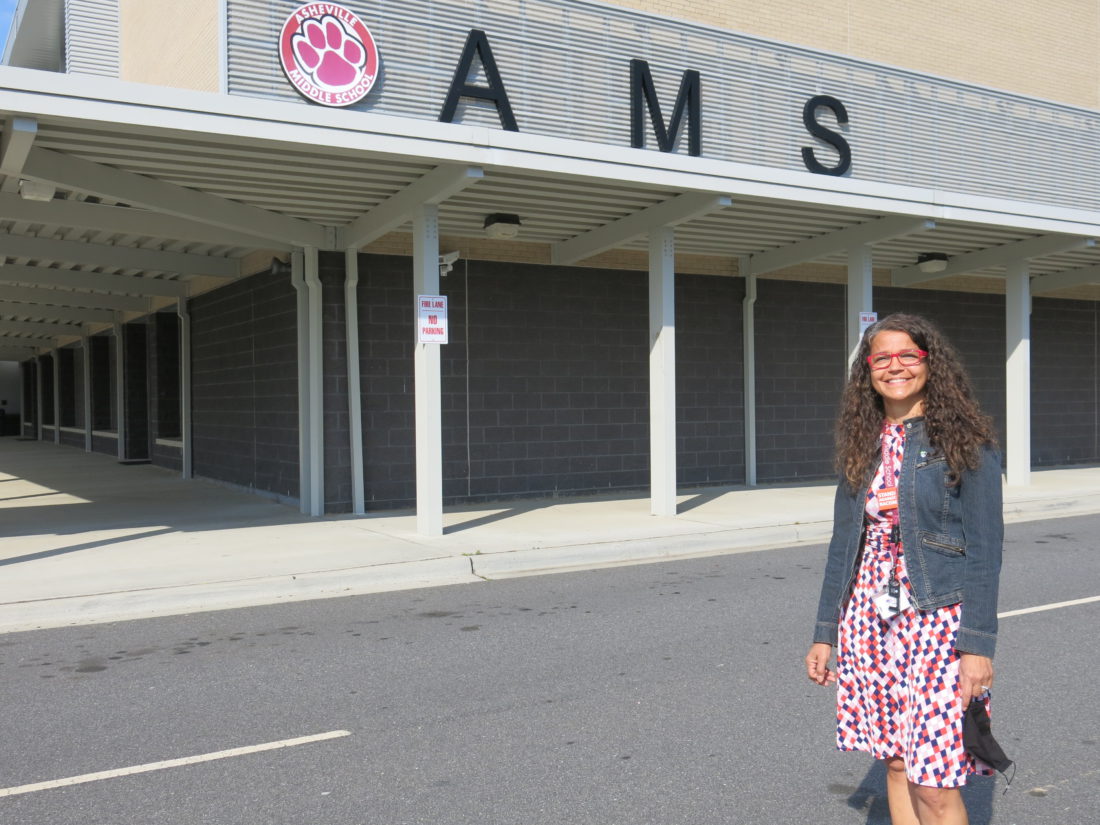“Why are we doing this?”
It’s a common question students raise, says Caroline Scerbin, seventh grade English language arts teacher at Asheville Middle School.
Another routine inquiry: “How am I going to use this in my life?”
Such doubts and resistance are nothing new to educators. But amid COVID-19 and the transition to virtual learning, such disinterest proved more difficult to manage. As the 2020 school year came to a close, Scerbin and fellow teacher Elaina Portugal (then of AMS but now at Rugby Middle School in Hendersonville) worked to address these challenges in advance of the 2021 school year.
Over the summer, the two teachers brainstormed ways to keep their online classes engaged come the fall. Finding inspiration from the local and national demonstrations for racial justice, the pair devised an inquiry-based unit exploring historical events, individuals and systems that shaped Western North Carolina and continue to influence the region today.
Dubbed the AMS Challenge Project, students have worked throughout the current school year to research the region’s past and consider how this information can inspire present-day change.
Natural curiosity
Part of that change, explains Scerbin, is the project itself. Currently, the North Carolina Standard Course of Study mandates coverage of historical events and artifacts, but the specifics around which individuals and incidents are highlighted are left up to the instructors.
The AMS Challenge Project provided students with broader choices. The course’s three available research topics included the history of the region’s Native American, European and enslaved populations. Providing options and allowing students to adjust their focus throughout the research process were critical to the project’s success, believes Portugal.
“Kids have a natural curiosity,” she explains. “When they start feeling like they own it and have some control over what they’re learning and how they’re learning it, they’re willing to go deeper and do more.”
Beyond the subjects, students were also permitted to select how they presented their findings. Poems, short films, podcasts, interviews, art projects and traditional reports were all in the mix.
Identifying and building upon a student’s strengths and interests, says Portugal, are also essential to success. “When you do this, they become more willing to take risks in other areas where maybe they’re not as confident.”
Inherit bias
For pupil Ashni Rhodes, the project’s flexibility resulted in a short documentary that examined all three topics. Among the greatest surprises during her research was an 1853 diary entry by Augustus Summerfield Merrimon, later included in his 1894 publication, A Memoir.

In the passage, Merrimon, who served as a U.S. senator and chief justice of the North Carolina Supreme Court (and for whom Merrimon Avenue is named), described slavery as a “divine appointment.” Later he added: “I am thoroughly convinced that Slavery in this country cannot be abolished without greater endangering our country. … If it is an evil in the abstract, it would be a greater evil to abolish it here.”
Uncovering this passage and other information about the region’s history had a profound impact on Rhodes. “I was extremely surprised to find out that so many of the people I was taught to look up to were actually pro-slavery and even slave owners themselves,” she says. “Learning our history unfolds the mistakes and achievements of our past and helps us figure out exactly what led to where we are today.”
Fellow classmate Kai Gilmer shares a similar experience. Whereas Rhodes produced a short film, Gilmer conducted a Zoom interview with Gail Thomas, a Cherokee elder. Speaking with Thomas offered insights into the Eastern Band’s history that Gilmer might not have otherwise learned. This included the role of the Doctrine of Discovery, which was used first by Spanish explorers and later European Christian settlers to justify the confiscation of lands from Native peoples.
“History teaches us that a lot of how we treat each other today is just about following what our ancestors did and not thinking for ourselves about how we actually want to treat one another,” Gilmer says. “We inherit biases and don’t work to change them.”
Finding empathy
Not taking the summer off, Scerbin says she is contemplating ways to improve next year’s project. One idea is to partner with other area schools to foster a broader dialogue. “I think it’s just invaluable when students get to know their [hometown] and own those facts and share them,” she says.
“One thing we’ve been talking about all year in the class is this idea of a single story and how there’s no such thing,” she continues. “We all have different life experiences and backgrounds. It only helps us as humans to really expand our thinking about that, rather than just putting people into little boxes.”
Portugal agrees, adding that one of the greatest rewards from the project has been “watching that empathy grow” within her students.
Exemplifying this point, Rhodes shares a change she’d like to see in Western North Carolina, based on her research.
“There is so much that needs to be done in order for us to achieve full equality,” she says. “We need to inform other people that racial discrimination is still a thing, and that you can help change this by doing something as little as informing a friend about our history or stepping in someone else’s shoes for a day.”




Before you comment
The comments section is here to provide a platform for civil dialogue on the issues we face together as a local community. Xpress is committed to offering this platform for all voices, but when the tone of the discussion gets nasty or strays off topic, we believe many people choose not to participate. Xpress editors are determined to moderate comments to ensure a constructive interchange is maintained. All comments judged not to be in keeping with the spirit of civil discourse will be removed and repeat violators will be banned. See here for our terms of service. Thank you for being part of this effort to promote respectful discussion.